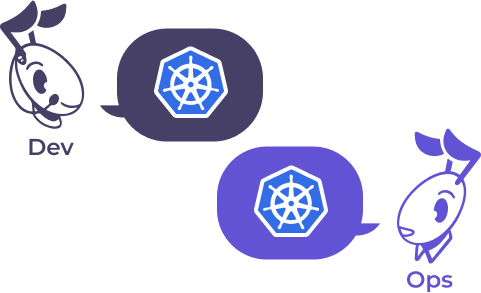Why Kubernetes
Kubernetes is the leading Open Source container platform and the globally accepted orchestration standard. It is the optimal solution when it comes to deploying microservice infrastructure and cloud-native applications.
-
91% of Cloud Native Computing Foundation (CNCF) community member companies use Kubernetes. i
-
K8s is one of the most popular projects on GitHub, with over 4,000 contributing companies. i
-
The percentage of organizations using Kubernetes in their production is rapidly growing. i
The percentage of organizations
using Kubernetes in their production
i


Kubernetes is the universal language of communication between development and operations teams. That's its greatest value of all.
The benefits of Kubernetes for businesses
-
Faster development process
73% of Portwox respondents cited this as the top benefit of adopting K8s.
Thanks to K8s' user-friendliness and automation, developers spend less time on the infrastructure and more time on coding. The time-to-market for products is consequently shortened.
-
Improved resource utilization
77% of Pepperdata respondents use Kubernetes to reduce cloud costs.
K8s makes optimal use of hardware and virtual server resources, in part through automatic cluster scaling. Clusters can be distributed among different cloud providers.
-
Effortless cloud migration
39% of VMware respondents cited effortless cloud migration as one of the reasons Kubernetes is worth using.
Clusters can be deployed locally, on bare metal, and in the cloud. The portability of containerized applications makes it easy to move them between clusters, migrate them to the cloud, and helps you adopt a hybrid infrastructure model.
-
Kubernetes is the industry standard
The DoKC study shows, that standardization is the key driver of K8s adoption in production.
Standardization reduces the risks associated with maintaining Kubernetes infrastructure. The share of engineers in the labor market with K8s skills is steadily increasing, as is the number of service companies with expertise in this area. As a result, you get to save on training and hiring developers and related specialists.
How to get started with Kubernetes
There are three basic options at your disposal
-
1. Do it yourself
K8s is a free-to-use Open Source solution. Anyone can build and maintain an infrastructure based on Kubernetes. However, this option is becoming less popular. VMware estimates that the percentage of companies that rely on in-house resources for dealing with Kubernetes was 29% in 2020 vs 18% in 2021.
Why it’s so challenging
-
Kubernetes is a complex constructor
Pure "vanilla" Kubernetes is rarely enough to meet the production needs of today. A full-fledged infrastructure based on K8s requires integration with monitoring, logging, and security tools — and that's just scratching the surface. Kubernetes can be thought of as an iceberg, with the underside growing significantly as the project's complexity and infrastructure requirements increase.
-
A lack of specialists
K8s needs regular maintenance and updates. This requires a dedicated operation team consisting of at least five engineers. At the same time, there is an increasing shortage of qualified DevOps engineers on the market. Building your own team of experienced DevOps professionals is a complex and time-consuming task beyond what most companies are capable of. It can take years to grow engineers within a company.
-
-
2. Using a ready-made platform
Kubernetes platforms are ready-to-use solutions based on K8s. They are suitable for companies for which operating K8s is not a core competence. In that case, the platform's maintenance will be handled by the company's own engineers, but this will not be their core activity.
Kubernetes platforms make it easier to use K8s. Furthermore, they are not tied to resource providers so that you can use different infrastructures for your installations, such as bare metal, private, and public clouds.
Examples of Kubernetes platforms:
-
OpenShift
-
Tanzu
-
-
3. Using managed Kubernetes
In this case, the mK8s provider manages the Kubernetes infrastructure and is responsible for it. Managed Kubernetes, unlike the platform variant described above, doesn’t require in-house engineers for basic infrastructure issues, as the vendor performs all these activities.
Flant offers a managed Kubernetes service based on the Deckhouse platform. This service frees customers of all low-level cluster management work, allowing them to completely focus on product design and development.

Kubernetes as a Service (KaaS) is yet another type of managed service global providers offer. Examples include:
-
EKS
-
AKS
-
GKE
-

As studies by Datadog, Flexera, CNCF, and others show, the popularity of managed Kubernetes and Kubernetes platforms is steadily growing.

